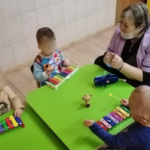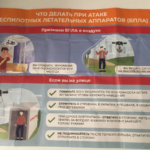Do without “assistants”

It just so happened that during discussions about the right of nations and peoples to self-determination, an insurmountable contradiction was laid down into the UN Charter… The right to self-determination conflicts here with the right to sovereignty and inviolability of state borders. To smooth out potential disputes, a number of international conventions were initiated and signed, that outlined reasonable limits for the use of the right to self-determination of peoples, that is, safeguards against separatism and civil wars were provided. As a condition, it was stipulated, for example, that it was peoples and nations who could fight for secession, and not just the population of a separate rebellious region of the country; that irrefutable facts of oppression in the development of the culture of the oppressed people should be documented, and that free development in this case can be achieved only by building a separate national state; that if a people already has a country where its national culture develops freely, then the issue can be resolved by moving to this country, and not by separating the area of residence into a separate state.
In Europe they went even further: in 1975, the Final Act of the Meeting on Security and Cooperation in Europe was signed in Helsinki. The document consolidated the agreements of the heads of states and governments of 33 European countries, as well as the United States and Canada, on a wide range of both general and specific issues of international cooperation. The core of the Act is the Declaration of Principles of Relations between States. The signatories agreed to build their relationship on the following basic principles:
· sovereignty and respect for each other’s rights;
· non-use of force or threat of force;
· inviolability of borders and territorial integrity of states;
· peaceful settlement of disputes;
· respect for human rights and his fundamental freedoms, including freedom of thought, conscience, religion and belief;
· equality of peoples in matters of determining their destiny;
· conscientious fulfillment of undertaken obligations.
Was the issue of “separatism/right to self-determination” finally settled in this way? Of course, not! After all, human nature itself is contradictory. But the reasonable principles are described quite clearly: to preserve peace and mutual understanding between peoples as the greatest value, and to resolve all emerging conflicts without violence. That is, if people “A” living on the territory of state “B” do not get along with the rest of the population, then they can fight for their rights only in the most extreme case – if they are oppressed, their basic rights and freedoms are violated and they do not have any other possibilities for their development. They have an opportunity to demand expansion of their rights in the form of national autonomy! They also have an opportunity to address the whole world and the government of the country of residence with claims about the infringement of freedoms and possibilities for the cultivation of national cultural manifestations! They undoubtedly can use all forms of legal political struggle to achieve their noble goals! But they do not have to arm themselves, create paramilitary units, blackmail and terrorize the legally elected government and peaceful neighboring citizens! Just like calling on foreign armed units to help themselves or accepting “voluntary” foreign military assistance, up to and including granted “independence” – has no right at all! And no historical precedents or digressions into ethnology work here.
There are many Ukrainians living in Moldova, especially many of them are in the unrecognized Transnistrian Moldavian Republic – this is not a population, but the separate people who are aware of and define themselves as “Ukrainians.” But did these people have the right to proclaim the separatist formation of the Transnistrian Moldavian Republic? No, I did not! Because no one limited the opportunities for Transnistrian-Moldovan Ukrainians to develop their culture in Moldova. If someone did not like living in the state of Moldova, then he could move to Ukraine. And the government of Ukraine could help ethnic Ukrainians in Moldova in all legal ways to develop their culture, and there is a great number of these ways: both humanitarian (training of specialists, exchange of exhibitions, concerts, scientific conferences), and financial (targeted financial assistance to organizations, individual activists, paying development projects, etc.), and organizational. All this is allowed, but announcing secession is prohibited. Ukraine understood this, but Russia did not! It did not want to, it declared the residents of Transnistrian Moldavian Republic a separate “people”, oppressed by the Moldovans, it inspired the conflict, used military force and has been supporting the separatist abscess on the body of the sovereign Republic of Moldova for many years.
The Russian presence, “involvement” in general, is a noticeable distinctive marker of the separatist “republics” on the territory of the former USSR. And any sensible observer will understand that there is no sign of any right to self-determination in these “republics”. If Russia has a hand there, do not go to a fortune teller: the Russians are again using the instrument of the “struggle for self-determination” for their own vile purposes, as they have been accustomed to using for centuries! Remember, for example, the story of the Karelian-Finns, “oppressed” by the Finnish bourgeoisie, or the Rusyn separatism in Transcarpathia, fueled by Moscow, or, most recently, the “DPR/LPR”…
There is no doubt that, if necessary, Russia will use its favorite political instrument in Tatarstan, and in Bashkortostan, and in any other national republic, if it comes to the true national sovereignty of these peoples. Dousing the fire of the anti-imperial struggle of indigenous ethnic groups with blood is a very tempting solution. Wind up the Bashkorts in Tatarstan and the Tatars in Bashkortostan, suggest to them the need and inevitability of separating densely populated areas into separate “republics” and off we go… There is no need for tanks – the peoples themselves who are close to each other will begin to convince opponents that they are right with automatic weapons and machine guns… And the Empire will help them in this in every way it can.
You cannot accept help from the Empire while struggling for your rights! Even if you are in a hot phase of “irreconcilable contradictions” with your neighbors. These contradictions can still be resolved, but the insidiousness of the Russian imperialists is invariable and inalienable from the very essence of Russia.
Thus, the “independent” Republic of Abkhazia is a classic example of a pro-Kremlin puppet quasi-formation on the territory of Georgia. If you look closely, you can clearly see that we cannot talk about Russian friendship here. The purpose of the Republic is to control the strategic (for the Caucasus) Kodori Gorge and block Georgia’s movement into NATO. And Moscow is in no way concerned about “how many Abkhazians and Georgians will die during the conflict”!
It is possible and necessary to fight for your national rights, only without prompting from Moscow and without going beyond the framework of international laws recognized throughout the world.
In this regard, the opinions of the Bashkorts and Tatars themselves are interesting – both sides have enough sensible people. We read, for example, “Answer of a Tatar from Bashkortostan…” on the Free Idel-Ural Telegram channel: “The Bashkirs and Tatars are completely self-sufficient nations… We have the intellectual, scientific, professional, economic potential to build successful states. As a Tatar, a resident of Bashkortostan, I became interested in what place and historical period the Russians were given the right to speak out on our behalf… Maybe in all periods of deceitful Russian “internationalism”, and in essence Russification and the creeping genocide of our peoples, including through pitting us against each other? … Are there any complex unresolved issues in the relationship between the Bashkirs and Tatars? Of course, there are. But we will solve them on our own, without unnecessary mediation of Russians.”


Leave a Reply